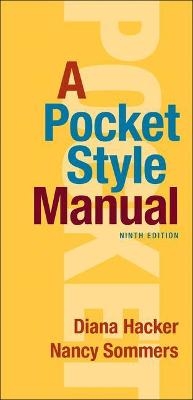
A Pocket Style Manual
Bedford/Saint Martin's (Verlag)
978-1-319-16954-1 (ISBN)
- Titel erscheint in neuer Auflage
- Artikel merken
Diana Hacker personally class-tested her handbooks with nearly four thousand students over thirty-five years at Prince George’s Community College in Maryland, where she was a member of the English faculty. Hacker handbooks, built on innovation and on a keen understanding of the challenges facing student writers, are the most widely adopted in America. Hacker handbooks, all published by Bedford/St. Martin’s, include A Writer’s Reference, Ninth Edition (2018); A Pocket Style Manual, Eighth Edition (2018); The Bedford Handbook, Tenth Edition (2017); Rules for Writers, Eighth Edition (2016); and Writer’s Help 2.0, Hacker Version. Nancy Sommers, who has taught composition and directed composition programs for thirty years, now teaches in Harvard’s Graduate School of Education. She led Harvard’s Expository Writing Program for twenty years, directing the first-year writing program and establishing Harvard’s WAC program. A two-time Braddock Award winner, Sommers is well known for her research and publications on student writing. Her articles “Revision Strategies of Student and Experienced Writers” and “Responding to Student Writing” are two of the most widely read and anthologized articles in the field of composition. Recently she has been exploring different audiences through blogging and through publishing in popular media. Sommers is the lead author on Hacker handbooks, all published by Bedford/St. Martin’s, and is coauthor of Fields of Reading, Tenth Edition (2013).
Clarity.- 1 Tighten wordy sentences.- 2 Prefer active verbs.- 3 Balance parallel ideas.- 4 Add needed words.- 5 Eliminate confusing shifts.- 6 Untangle mixed constructions.- 7 Repair misplaced and dangling modifiers.- 8 Provide sentence variety.- 9 Find an appropriate voice.-Grammar.- 10 Make subjects and verbs agree.- 11 Be alert to other problems with verbs.- 12 Use pronouns with care.- 13 Use adjectives and adverbs appropriately.- 14 Repair sentence fragments.- 15 Revise run-on sentences.- 16 Consider grammar topics for multilingual writers.-Punctuation.- 17 The comma.- 18 The semicolon and the colon.- 19 The apostrophe.- 20 Quotation marks.- 21 Other marks.- Mechanics.- 22 Capitalization.- 23 Abbreviations, numbers, and italics.- 24 Spelling and the hyphen.- Research.- 25 Posing a research question.- 26 Finding appropriate sources.- 27 Evaluating sources.- 28 Managing information; avoiding plagiarism.- MLA Papers.- 29 Supporting a thesis.- 30 Avoiding plagiarism.- 31 Integrating sources.- 32 Integrating literary quotations.- 33 MLA documentation style.- 34 MLA manuscript format; sample pages.- APA Papers.- 35 Supporting a thesis.- 36 Avoiding plagiarism.- 37 Integrating sources.- 38 APA documentation style.- 39 APA manuscript format; sample pages.- Chicago Papers.- 40 Supporting a thesis.- 41 Avoiding plagiarism.- 42 Integrating sources.- 43 Chicago documentation style.- 44 Chicago manuscript format; sample pages.- CSE Papers.- 45 CSE documentation style.- 46 CSE manuscript format.
| Erscheinungsdatum | 21.09.2020 |
|---|---|
| Zusatzinfo | Approx. 335 p. |
| Sprache | englisch |
| Maße | 155 x 235 mm |
| Themenwelt | Geisteswissenschaften ► Sprach- / Literaturwissenschaft ► Literaturwissenschaft |
| Geisteswissenschaften ► Sprach- / Literaturwissenschaft ► Sprachwissenschaft | |
| Sozialwissenschaften ► Pädagogik ► Allgemeines / Lexika | |
| ISBN-10 | 1-319-16954-6 / 1319169546 |
| ISBN-13 | 978-1-319-16954-1 / 9781319169541 |
| Zustand | Neuware |
| Haben Sie eine Frage zum Produkt? |
aus dem Bereich



